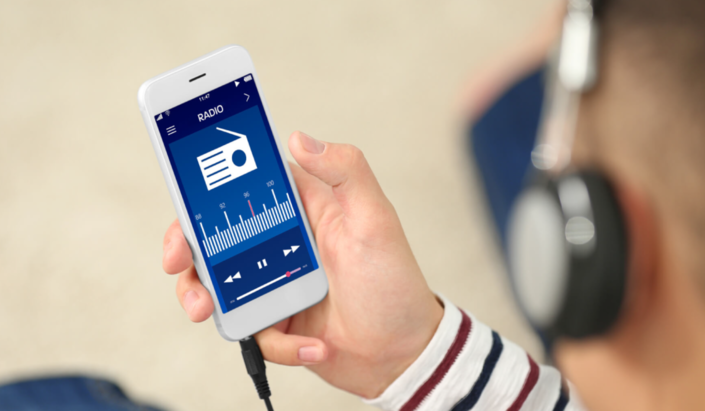Looking to learn how to start your own internet radio station? You're not alone. The internet radio market is expanding at a compound annual growth rate of 18.2%, placing it on track to reach a value of $9.2 billion by 2030, projects Market Research Future.
One reason driving this growing demand is the fact that starting your own internet radio station can be simple when you have the knowledge and the right tools.
In this article, we'll provide a step-by-step guide to how to start online radio station operations successfully. We'll cover the following:
- What an internet radio station is
- The difference between internet radio station vs. terrestrial radio station operations
- The benefits of online radio stations
- Planning your internet radio station
- Essential internet radio station equipment and software
- Compliance with legal requirements for internet radio
- Choosing an online broadcasting platform
- Developing your online radio station programming
- Marketing and promoting your internet radio station to attract listeners
- Monetizing your internet radio station
- Continuously improving and growing your internet radio station
Let's get started!

What Is an Internet Radio Station?
An internet radio station is a broadcasting channel that delivers content online. Listeners can access broadcasts through a web browser, mobile app, or internet-connected device. Content may include music, sports, talk radio, faith broadcasts, or other formats.
Internet Radio Station vs. Terrestrial Radio Station
Online radio stations differ from conventional land-based terrestrial radio stations in several important respects. Some of the most notable differences include the following:
- Channel: internet radio uses online channels to broadcast content, while terrestrial radio uses traditional radio waves broadcast from radio antennas or towers
- Reach: online radio stations can reach a global audience anywhere there is an internet connection. In contrast, terrestrial radio stations may have geographic limitations based on the range of their signal
- Programming: internet radio stations lend themselves easily to specialized programming targeting specific niches, while terrestrial radio stations often feature more limited programming options
- Advertising: internet radio stations can use online marketing tools to deliver targeted, personalized advertisements, while ads on terrestrial radio stations typically aim for a broader audience
Along with these differences, internet radio and traditional radio share several similarities. For instance, the same music formats may be broadcast using either method. Many terrestrial radio operations also support internet radio stations to increase their efficiency, extend the range of their outreach, or test formats. See our pillar guide on how to start a radio station for more information on how internet radio stations compare to terrestrial radio stations.
Benefits of Internet Radio Stations
The benefits of internet radio stations have made them an attractive alternative to terrestrial stations for entrepreneurs interested in broadcasting. Some of the numerous benefits of internet radio stations include:
- Low start-up costs: Starting an online radio station can be less expensive than starting a terrestrial one. It doesn't require expensive transmission gear or specialized radio frequency licenses.
- Expanded reach: Anyone with an online connection can listen to internet radio stations, no matter where they are. Compared to a terrestrial radio station, this enables a significantly wider audience.
- Scheduling flexibility: Content can be recorded and broadcast from anywhere, and internet radio stations can be operated manually or automatically. As a result, your channel can run on a 24-hour schedule without using live presenters.
- Improved audience segmentation: Internet radio stations can reach specialized markets that may be out of reach for terrestrial radio stations. This capability makes it easier to customize broadcasts to reach niche audiences.
- Increased audience interactivity: Internet radio stations can communicate with their listeners through chat rooms, email, social media, and other channels, which can help them develop a devoted following. This capability allows greater engagement than terrestrial radio stations.
- Automation capability: Internet radio stations can be run automatically, which removes the need for live staff and allows you to concentrate on other areas of your company.
- Scalability: Internet radio stations can scale up or down as necessary, letting your station expand and evolve.
- Opportunity for monetization: Internet radio stations can be made profitable by sponsorships, advertising, and other sources of income. With a host that offers built-in advertising, you can easily connect with advertisers optimized for your target audiences.
- Testing programming and advertising: An online radio station can use digital analytics tools to accurately test audience responses to programming and ads. Even for terrestrial stations, starting another radio station online can be an inexpensive way to test new programming and advertising angles.
These benefits make internet radio stations a winning proposition for broadcasters seeking a low-cost, efficient way to reach audiences and monetize their operations.
Start your own station today with our 7-day free trial. Try for free.

How Can I Start My Own Internet Radio Station?
Starting your own successful internet radio station is a process that begins with careful planning, proceeds through launching your programming, and continues with ongoing marketing, monetization, and growth. The process can be divided into eight stages:
- Planning your internet radio station
- Gathering essential internet radio station equipment and software
- Complying with legal requirements for internet radio
- Choosing an online broadcasting platform
- Developing your internet radio station programming
- Marketing and promoting your internet radio station to attract listeners
- Monetizing your internet radio station
- Continuously improving and growing your internet radio station
Let's break down what each step involves and how to execute each one successfully:
1. Plan Out Your Internet Radio Station
A successful internet radio station starts with well-designed planning and preparation, laying the groundwork for a financially sustainable operation. This groundwork should include a business plan encompassing your radio format strategy and financial planning. Let's examine these components separately:

Create a Business Plan
Your business plan documents your strategy for running your internet radio station, promoting your broadcasts, and managing your finances. Investing time in developing a written business plan can significantly increase the likelihood of your radio station succeeding. Failing to develop one can doom your operation to failure.
A comprehensive business plan should include several key components:
- Executive summary: The executive summary highlights the main points of each section of your plan for quick reference. It also helps make your plan easier to read for loan providers and investors, improving your ability to obtain financing. Finally, it is a reference point for updating your plan as your business develops.
- Internet radio station description: This section briefly explains what your station broadcasts, who your audience is, and how you stand out from competitors.
- Market research: Here, you can develop an analysis of your market, including:
- A description of your target market
- An estimate of your market's size
- An analysis of what your audience likes
- An identification of who your main competitors are
- An analysis of what your competitors offer the market
- This research will help you identify what you can offer audiences to distinguish your internet radio station from the competition. It also will help you develop an advertising strategy geared toward your market.
- Organizational plan: In this section, lay out what legal structure you will use to create your business, how you will set up your organizational chart, and how you will run your operations. This plan can include identifying any staffing positions you need to fill. If you plan to use software to automate your operations, such as playout automation tools, you can mention that here.
- Programming description: Describe what type of programming format your station will follow. Emphasize what will be unique about your station's programming compared to other stations.
- Marketing and sales strategy: This section summarizes vital information critical for planning how you will make money from your programming. It should include an outline of your marketing strategy to attract listeners to your channel. Consider where you can reach your audience, what methods you will use to reach them, and what message you will use to attract them. You should also include a description of your advertising strategy, explaining your target advertisers and how you will connect with them. Live365 provides tools to help you build your audience and monetize your station by finding advertisers who match your listeners.
- Financial projections: Here, you should estimate your expenses and revenue during your first three to five years of operations. Include an income statement, balance sheet, and cash-flow projections. This information will help determine how much financing you'll need to sustain your broadcasts. If you need help developing financial projections, talk to an accountant or an experienced business mentor.
- Funding request: This section is intended for loan providers and investors and summarizes how much financing you'll need to cover the start-up phase of your operation. Include what you need, what you'll be spending it on, and when you expect to be able to pay it back. Use your financial projections to help you determine these figures.
Writing down your business plan when starting your radio station is crucial. Reviewing your plan periodically and updating it to reflect changes in your business is also advisable.
Choose a Radio Format
As you write your business plan, you should determine the specific format niche for your internet radio station. Your format helps define your market, target audience, and advertising strategy, all essential ingredients for a successful station.
Some of the most popular radio station formats are:
- Talk radio, news, and sports
- Rock and alternative music
- Classic rock music
- Pop contemporary music
- Adult contemporary music
- Hip Hop/ R&B music
- Country music
- Classical music
- Oldies
- Faith-based broadcasting
- Spanish regional broadcasting
Also, consider how you intend to mix recorded broadcasting with live broadcasts. A strong on-air talent team can help your station stand out. However, you also can run a successful station by delivering quality recorded content. Live365 station management tools even let you automate your programming selection to match the tastes of your target audience.
Plan Your Finances
We touched on financial projections above, but it's worth elaborating on because your financial planning is one of the most important parts of your business plan. It tells you how much money you'll need to run your operation, how much revenue you expect to have available to cover expenses, and how much you'll need to close the gap between revenue and expenses. It also helps you estimate the profitability and growth of your station over time.
One item you'll need to cover is determining your start-up and ongoing costs: Establish a budget for your station, including costs for equipment, licensing, marketing, and other expenses.
You should also estimate your revenue from advertising. Estimating this accurately is challenging when you're first starting. As your station grows, you'll gain more insight into accurate estimates.
Internet radio advertisers estimate revenue using key performance indicators (KPIs) which track variables such as:
- The number of listeners streaming your broadcasts (known as audio reach)
- The number of times listeners play your ads all the way through (listen-through rate)
- The number of times your ads are played for a listener (audio impressions)
- The number of ad listeners that click on banner ads accompanying your broadcasts (click-through rate).
Tracking this data as your station grows will help you plan accurate financial forecasts.

2. Source Essential Equipment and Software
When planning your finances for your internet radio station, one expense category you'll need to include is studio equipment. This expense includes both hardware and software.
At the very least, you'll need a computer, an internet connection, and content (like music or pre-recorded talk shows). If you plan on broadcasting sports shows, delivering talk radio segments, or interjecting comments between music, it helps to have a good microphone and recording and editing software. Investing in quality audio equipment will help ensure that your broadcasts sound professional.
However, you don't necessarily have to buy all your equipment immediately if you can't afford it. If you're on a tight budget, choose high-quality equipment and software that fits your current needs. You can purchase additional new equipment as your station scales up.
To start with what you need to begin broadcasting, we've compiled a list of the basic equipment you will need to start an internet radio station:
- Radio broadcasting software: used to broadcast your radio station and automate the management of your broadcasts for greater efficiency
- Computer: runs broadcasting software and handles audio processing
- Stable internet connection: enables your broadcasts to be delivered online
- Music library: provides your music and other audio files to be used in your broadcasts, which you can store locally or online with a cloud provider
The equipment above will get your internet radio station up and running. The following equipment is recommended for professional audio quality but not required to begin broadcasting:
- Audio mixer: controls the volume of multiple audio sources and adjusts the sound quality of your broadcast
- Microphone: captures live announcements, interviews, and other live content
- Audio processing software: enhances the sound quality of your broadcast by adjusting the volume and frequency (equalization), reducing sounds that exceed an optimized range (compression), or restricting sound within an optimized range (limiting)
- Headphones: monitors your broadcast and avoiding feedback
You can purchase many other equipment items to improve your sound quality over time as your revenue and budget increase. But the items above will enable you to start broadcasting and deliver professional audio quality on a start-up budget.

3. Comply With the Legal Requirements for Internet Radio
Knowing how to start an internet radio station legally and ethically will help you avoid legal hassles and financial penalties. Fortunately, legal compliance is easier for internet radio operators than terrestrial radio stations. Your main licensing requirements are music licensing and business licensing. You don't need federal licensing as you would with a terrestrial radio station. Here's what you need to know about these key areas:
Music Licensing
Depending on the type of content you're airing, you may need a license to broadcast copyrighted materials legally. For example, you must obtain licensing to play copyrighted music on your internet radio station legally. Normally, you must obtain music licenses directly from performance rights organizations such as the American Society of Composers, Authors, and Publishers (ASCAP), Broadcast Music, Inc. (BMI), SESAC (originally the Society of European Stage Authors and Composers), and SoundExchange.
Fortunately, Live365 has pre-existing arrangements with today's leading performance rights organizations in the US, Canada, Mexico, and the UK to save you time applying for internet radio licensing. When you sign up for our broadcasting platform packages, your licensing fees are built in.
Business Licensing
If you plan to earn profit from your internet radio station or claim deductions on your expenses, you'll need to obtain business licensing. Under IRS regulations, you must report income even if you're running your internet radio station as a hobby. If your station turns a profit, you must report your income as business income. An advantage of operating as a business is that you can claim deductions for expenses such as equipment and software. To enjoy this advantage, you'll need to obtain business licensing.
Requirements for business licenses vary by state. You can learn the requirements in your area by checking with your state's department of revenue or the equivalent agency. If you have questions, consult a business formation attorney.
Federal Communications Commission (FCC) Regulations
The good news is that if you operate an internet radio station, you don't need a license from the federal government. The FCC does not regulate internet radio like the terrestrial radio industry. There is no issue with radio frequency bandwidth competition as with AM and FM broadcasts. You can use internet radio to deliver uncensored legal content broadcasts that adhere to your provider's terms of service. For example, Live365's terms of service specify certain prohibited uses, such as broadcasting copyrighted material without authorization, impersonating a person or entity, or violating personal or proprietary rights.
4. Choose an Internet Broadcasting Platform
With your studio gear and licensing taken care of, it's time to focus on finding a service provider for airing your broadcasts. A stream hosting provider will allow you to upload and broadcast your content live using an encoder. You'll need to determine what you want from your online station, research a few providers, and pick the one that best meets your needs.
Here's a checklist of what to consider when evaluating internet radio broadcasting platforms:
- Cost: Just as you'd pay for your website hosting, there's (usually) a cost associated with hosting an internet radio station. Pricing can vary based on factors such as:
- How many listening hours you need to deliver per month
- How much storage space you need for your content library
- What distribution options you want
- How much support you require
Look for a pricing tier that is scaled to your needs and budget.
- Monetization with ads: Did you know you could lower your bill with your provider by allowing ads on your station? If you'd prefer to have no ads or even bring your own ads, you'll need to find a provider to accommodate that.
- TLH (Total Listening Hours): Many providers cap your total listening hours based on your paid plan. If you have 32 listeners, and on average, they each listen for 45 minutes, your TLH would be 24 ([Number of Listeners x Average Minutes Listened] ÷ Minutes in an Hour = Total Listening Hours.) Most providers have different levels of TLH for you to choose from, or they use some other metric for restricting your account. Ensure you understand your provider's terms before signing up for a broadcasting platform service.
- Automated vs. live broadcasting: Do you want to set up a playlist, hit "broadcast," and then go about your day? Would you prefer to broadcast live? How about a mix of both? Make sure your provider is capable of whatever you choose. Some providers include automated tools to help you schedule playlists ahead of time or even have the software fill in gaps automatically for 24/7 streaming. This feature can save you significant time managing your station and help you avoid dead air time caused by selection gaps.
- Licensing: If you're broadcasting copyrighted materials, you'll need to obtain licensing, as mentioned earlier. Check whether your prospective provider offers licensing assistance for your broadcasting package.
- Distribution: How will your station's great content get noticed? Do you want to promote the station yourself, or would you benefit from the service provider pushing your content out to appropriate audiences? Of course, you can also do both. Still, you can save considerable time and reach a wider audience by using a provider that offers distribution support.
You can spend a lot of time researching and comparing different providers to see how they stack up in these categories. Or you can save time by starting your search with the Live365 radio broadcasting platform, designed to cover all your needs. Our platform includes automated management features, streamlined licensing arrangements, distribution opportunities, and monetization services. Different pricing tiers are available to meet users' needs with different Total Listening Hours and budgeting requirements.

5. Develop Your Internet Radio Station's Programming
The success of your internet radio station depends heavily on your programming strategy. Matching your programming to what your target demographic wants will help you attract and win new listeners, while failing to do so risks leaving your broadcasts without an audience. When developing your programming strategy, here are a few key considerations to take into account:
- Music selection: Choosing the right music is an important aspect of programming your internet radio station. Consider your target audience and their musical preferences, and curate a music library that appeals to them. Utilizing the market research you conducted while developing your business plan is crucial here. Update your research with ongoing tracking to fine-tune your programming to your audience's preferences.
- Scheduling: Creating a consistent and organized schedule for your broadcasts is important for your listeners. If audiences like what you're playing, loyal listeners will want to know when to tune in to hear more, but if they don't know when to tune in, they may quit listening. Additionally, scheduling can make managing your internet radio station easier for your staff. Plan out show times, hosts, and content in advance to ensure a smooth and structured broadcast.
- Live broadcasting: Live broadcasting is an exciting aspect of internet radio and allows for interactivity with your listeners. Having the right equipment and technology is important to ensure high-quality live broadcasts. An ideal solution is playout software which lets you automate the scheduling of live broadcasting segments between blocks of recorded content. For effective live broadcasting, you also need engaging on-air personalities. Consider hiring staff with exceptional on-air skills that can help your station stand out.
- Creating show content: Creating engaging and relevant content for your shows is important for keeping your listeners interested and entertained. This content can include music, interviews, live events, and other content that appeal to your target audience. A balanced mix of multiple content categories can help your program appeal to various tastes and moods.
Live365 provides station management tools to help you automate your programming. You can store tracks in an online library, manually select your playlists, or have our AutoDJ tool automatically select tracks from your library. Schedule both recorded and live events ahead of time for efficient management.

6. Market and Promote Your Station
Marketing is the key to growing your internet radio station audience. You can use several methods to promote your broadcasts. Methods of marketing your station include:
- Social media promotion: Social media platforms such as Twitter, TikTok, Instagram, and Facebook, allow you to share posts promoting your broadcasts, attract listeners, and find audiences who match the characteristics of your target market. For example, you can use social media analytics to find users who like specific types of music and learn what other types of music, artists, and hobbies they like.
- Networking: Tapping into existing networks can be a faster way to find listeners than building your audience from scratch. Look for individuals, businesses, nonprofits, and other organizations already in contact with the type of audiences you're trying to reach. Make a list of possible promotional or advertising partners. Contact them through networking events, such as entertainment industry events, community events, chamber of commerce meetings, and trade shows.
- Collaboration with other stations: Non-competing radio stations can be great promotional partners. For example, if your station primarily airs music, but your target audience is a demographic that tends to follow a certain sport, you might partner with stations that air sports programming to listeners in your market.
- Send press releases to local outlets: Press releases are a free way to publicize your station to local media. You can release press releases for occasions such as station launches, holidays, live events, and other special events and submit them to local outlets for potential coverage.
- Submit to online radio directories: Internet radio directories can help you get noticed by listeners searching for stations like yours. Submit a well-designed station description highlighting what's unique about your programming. Use your market research to help you craft a listing that will appeal to your target audience.
- Develop a website with written content: A website can be a great promotional tool to publicize your internet radio station on search engines and attract visits from searchers in your target market. You also can drive traffic to your site through paid ads, social media, and video platforms. Attract traffic to your site by using keyword research to identify topics appealing to your target audience and posting engaging content such as blog posts or even transcripts.
- Distribution: Radio distribution services provide a fast, efficient way to promote your station to bigger audiences. For example, Live365 provides audience-building services that expand your outreach to over 30 million US listeners on over 200 connected devices via TuneIn On Air distribution.
You can use these marketing methods individually or in combination. Test different marketing tools on a small scale and determine what works best for you before scaling up your investment.
7. Monetize Your Radio Station
Monetization lets you cover the costs of your internet radio station and turn a profit as your audience grows. Use monetization tactics that align with your station's goals and target audience. Options include:
- Programmatic advertising: Running ads between your program content lets you earn money by selling products that match the spending habits of your listening audience. Live365's online radio ads tool connects you with the biggest ad exchanges and trading desks and directly represents your inventory to buyers. Ad buyers can buy ad inventory across our platform to maximize revenue for stations like yours. To simplify your ad management, you can schedule ads to air automatically at intervals you select, such as 30-minute, 60-minute, or 90-minute intervals.
- Sponsorships: Ongoing sponsorship relationships can provide you with a steady source of ad revenue. Cultivate partnerships with sponsors who sell products appealing to your target audience.
- Donations: Inviting listeners to donate can be another way to raise money. You can put a donate button on your site and ask listeners to donate if they like your broadcasts. You also can host special fundraising events, such as on-air variety shows, contests, or raffles.
- Direct sales: You can use segment breaks to offer products directly to your audience. For example, you might offer an exclusive album featuring music from an artist appearing on your station who has agreed to split profits with you in return for publicity. You can also work with local businesses to sell ad space during your segment breaks. You can vary your pricing based on the length of the ad, the number of times it will be played, and the time of day it will air. You can also vary the pricing based on whether the local business provides their own audio or requires you to produce the ad for them.
One or more of these methods may work well for your station. Test different monetization methods and focus on the ones which yield the best return.

8. Continuously Improve and Grow Your Radio Station
To maximize your audience and revenue, leverage the power of big data analytics to improve the quality of your broadcasts, promotions, and advertising. Here are some best practices for using internet radio data analytics to help you better understand your listeners and the performance of your station:
- Monitor your audience: Data monitoring provides objective information on your audience, so you don't have to guess. Track data on your audience size and listening patterns using analytics software like Google Analytics or Live365's audience measurement tools.
- Get to know your listeners: Use your data to analyze your audience's demographics, location, and listening patterns. This data allows you to adjust your programming and advertising to your audience and customize ads for individual listeners.
- Identify your best-performing content: Use analytics to identify your most popular content. You then can showcase top-performing content to generate maximum audience engagement during prime listening hours.
- Use A/B testing: Employ A/B split testing to evaluate various aspects of your website, such as headline text, design, color scheme, and call-to-action buttons. A/B testing lets you compare how different options perform so you can optimize your site for maximum results.
Effective use of these strategies depends on the right analytics software. The Live365 broadcasting platform provides built-in statistics tools to help you collect the data you need to make informed decisions that improve the performance of your internet radio station.
Start an Internet Radio Station the Easy Way
Starting an internet radio station doesn't have to be hard when you have the right strategy and tools. Developing a business plan, formatting theme, and budget set you off on the right foot. Essential equipment begins with a computer, an internet connection, and broadcasting software. Optional audio equipment can then improve the quality of your broadcasts.
You'll need licensing coverage if you plan to use copyrighted music or other copyrighted content. An internet broadcasting platform lets you automate your operations so you're ready to go on air.
Once you've completed these steps, you've laid a foundation to develop your programming, promote your station, and monetize your broadcasts. Monitoring your performance enables you to continually improve your broadcast quality and grow your audience.
Implementing these steps can be simpler than you think. Live365 aims to make internet radio as easy as possible for broadcasters like you. We handle monetization, distribution, and licensing and have packages to meet all needs. Questions? Email [email protected].
Start your station today with Live365's 7-day FREE trial!
Don't just take our word for it, though. See just how many stations have chosen simple, seamless streaming at live365.com/listen.
Internet Radio Station FAQs
How much does it cost to start an internet radio station?
At a minimum, you'll need to cover the cost of a computer, internet connection, and broadcasting platform. You can get a laptop for less than $600, an Internet connection for less than $100 a month in most places, and a Live365 broadcasting platform subscription for $59 a month and up, depending on your needs. You should budget roughly $2,500 during your first year for these items. You can subtract these costs if you already have a computer and internet connection.
You can improve your sound quality by investing in a few hundred dollars worth of audio equipment. For example, headphones for internet broadcasting cost about $70 to $300, while you can purchase internet radio microphones for about $50 to $400. You can spend more on these and additional equipment as your revenue increases and your budget allows.
You must pay licensing fees to broadcast copyrighted content such as music. Fortunately, if you use Live365 for internet broadcasting, your licensing fees are built into your pricing.
Remember that business expenses for your internet radio station can be tax-deductible. Keep receipts for your purchases and track your expenses to take advantage of tax breaks you may be eligible for. You must use equipment such as computers and services such as internet connections primarily for business rather than personal purposes to qualify for business deductions. Segregate your business and personal expenses in your bookkeeping to maximize your eligibility for deductions.
Do internet radio stations make money?
Internet radio stations can make money from advertising. Live365 provides monetization tools to help you connect with advertisers and earn money from your broadcasts. You also can advertise your products if you sell any or sell ad space to local businesses.
Do internet radio stations have to pay royalties?
Internet radio stations must pay for the rights to broadcast copyrighted content such as music. Typically, this is paid for through royalties via licensing fees. However, some licensing arrangements use one-time royalty-free fees rather than royalties. Live365 includes your licensing fees when you sign up for one of our internet broadcaster packages.
Ready to start your own station? Contact one of our Product Consultants or visit our website today. Discover thousands of free stations from every genre of music and talk at Live365.com. Rather listen on our app? Download the Live365 app on iOS or Android. Keep up with the latest news by following us on Facebook (Live365 (Official) and Live365 Broadcasting) and Twitter (@Live365 and @Broadcast365)!
Article Image: A group of radio hosts talking in the studio during a segment.


